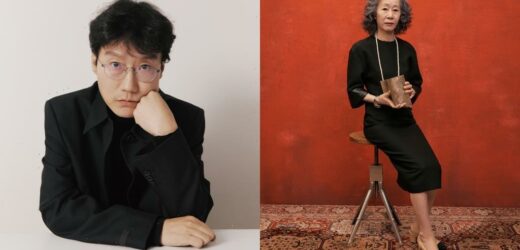Youn Yuh-jung
Youn Yuh-jung, a 74-year-old actor whose career spans five decades, became a top-rated performer and an iconic star in the early 1970s with her breakout role in the 1971 thriller “Woman of Fire.” Since then, Youn has gone on to portray some of the most unconventional women in modern Korean cinema, captivating audiences with her fearless spirit and inspiring the next generation of entertainers.
Earlier this year, Youn made history by becoming the first Korean actor to win the Academy Award for supporting actress for her performance in “Minari.” As she took the stage to deliver her acceptance speech, she used her moment in the spotlight to impart a message of unity and empathy, values that have helped guide her career over the years. Her words at the ceremony went viral, with many praising her wit and charm. During her speech, she spoke about the importance of diversity and coexistence, and expressed how she doesn’t view other actors as her competition.
Reflecting back on her historic achievement, Youn speaks fondly about how meaningful it has been to see her career encourage people from older generations to pursue their dreams.
“It was rewarding to hear many elderly people, who are usually depressed and discouraged, saying that they were inspired by me because it means they can still work and start something, just like me,” Youn says. “After I got the award, I thought about the word ‘support.’ I cared so much about getting leading roles when I was younger, but now that I am 74, I feel that I need to support the younger generation. I am so grateful that I got the award as a supporting actress. It is beautiful that I can be support for somebody.”
Looking ahead at what’s in store for her, Youn remains unfazed by the heightened fame and recognition that comes with being honored with a statuette.
“After my Academy Award, many people said, ‘Oh, she must be chasing more opportunities to work in Hollywood, or some leading roles (because she is famous now).’ No. I promised myself that the award is not going to change me,” Youn says.
Hwang Dong-hyuk
The greatness of Hwang Dong-hyuk’s “Squid Game” is that the hit series makes you think about it — and meme it — long after you’ve finished watching. And more broadly, that’s the South Korean director and screenwriter’s raison d’être as a creator.
While Hwang may be a new name to many, “Squid Game” is only the latest impactful release from the boundary-pushing director who fully immerses viewers in his cinematic visions. Among his biggest hits are 2011’s “Silenced,” which spotlighted abuses in schools for deaf students leading to legal investigations and changes to South Korean law, and 2014’s musical dramedy “Miss Granny,” which explored a family’s intergenerational dynamics. Practically everything he touches spurs conversations longer than their running time.
“I think the attitude that I will always sort of carry on throughout my career is high risk and high return,” the 50-year-old declares.
The multifaceted nature of Hwang’s work comes from the way he approaches his craft first and foremost as entertainment.
“The most important goal I have is that I want people to not feel bored, and just have fun watching,” reflects Hwang. “My next goal is for people to enjoy my works and not forget about them, but instead feel the desire to sort of talk with other people about the questions and thoughts that my work has raised — and maybe try to find an answer to these questions.”
Hwang is happily “riding the roller coaster” of the success of “Squid Game,” and he believes it’s just the latest acknowledgment of Korea’s rise as a global entertainment mainstay.
“We’re at a point where Korean content is not successful just momentarily or just project by project. Korean culture and Korean entertainment as a whole are gaining trust and gaining a fandom internationally where people trust Korean products, and actively seek out and enjoy them.”
Yu Jae-seok
With a career spanning over three decades, award-winning comedian and television host Yu Jae-seok has long been known as one of South Korea’s most celebrated names in entertainment.
In the rapidly changing entertainment industry, the 49-year-old remains on top of his game, as evidenced by the success of his recent show, “You Quiz on the Block.” Although the program is vastly different from Yu’s earlier works, it won an array of awards, exemplifying how audiences are eager to support shows that challenge traditional formats.
While “You Quiz” occasionally features celebrities, more often than not, it has broken convention by going out onto the street and bringing the stories of everyday people into the spotlight. In one viral clip that has garnered millions of views, for example, Yu is brought to tears while interviewing a nurse who volunteered to work in a city where COVID-19 was running rampant. Although the show has had to adapt its production strategies to safely capture content during the pandemic, Yu and his team are looking forward to being able to reintroduce the original format again in the future.
“I think I’ve always enjoyed listening to people,” Yu says. “When I listen to their stories, it’s in my nature to empathize with what they’ve gone through. In real life as well, I spend a lot of time having conversations with people and communicating with them. Hosting ‘You Quiz,’ I get to learn and understand a lot from the guests’ life stories.”
The runaway success of “You Quiz” highlights Yu’s ability to create entertainment from unconventional sources. “Every time I start a new show, I ask myself: Should I swim with the mainstream and follow the trend that’s already there?” Yu says. “As a comedian who has been in the scene for a long time, I believe it is more meaningful to challenge myself.”
The comedian adds that his unconventional show is the fruit of collective effort. “No matter how much I long for challenges, it would not have been possible without my colleagues and staff who have gladly joined me.”
Choi Jung-nam
K-pop acts are often praised for their catchy choreography and skillful dance performances. Thousands of fans cover key moves of hit K-pop choreographies on social media platforms, racking up millions of views. Yet the choreographers and professional dancers who create the original performances and grace the stages from behind the scenes have hardly ever received their moment in the spotlight — until now, with the rise of “Street Dance Woman Fighter,” one of the most talked-about South Korean TV programs of 2021.
In the hit show, female street dance crews participate in survival dance battles and choreography challenges. Viewers have been especially captivated by cutthroat rivalries, showy performances and strong solidarity among the dancers.
“In this era of ‘hyper-entertainmentism,’ I think anything can turn into entertainment,” says Choi Jung-nam, director and producer of “Street Dance Woman Fighter.” “Neither street dancers nor non-celebrity female dancers have been considered as success factors in TV shows, but thankfully people showed a lot of love and support.”
Choi adds: “What I learned from the process is that no matter how unpopular your thing might seem now, there will one day be a chance to prove yourself with it.”
Indeed, Choi has produced multiple dance-themed programs for Mnet, CJ ENM’s television channel for trendy entertainment, over the past 14 years, but none of these has reached the level of success of “Street Dance Woman Fighter.”
“It is the same for the dancers,” Choi continues. “Their flawless techniques, as well as clips of dance practices and competitions from the past — which charmed and attracted the viewers to come back to watch every episode each week — are traces of their long-term hard work that had not been noticed before.”
Now that “Street Dance Woman Fighter” has wrapped up its first season, Choi is envisioning a future for herself that goes beyond television.
“I’m imagining that it could be goods or even a talent that I produce. I hope to try other, or collective, forms of entertainment someday,” she shares. “I’m sure my experiences in TV will be useful in whatever I do in the entertainment world.”
BTS
To speak is easy. To become the voice of a generation is much more difficult.
But since debuting as a K-pop group in 2013, BTS has done just that, thanks to their dedication to creating music with meaning.
In the years following their launch, the South Korean septet has broken records and cultural boundaries, and inspired their fans around the world, known collectively as ARMY, to pursue positivity.
“From the very beginning of our musical career, lyrics that speak about dreams, hopes and social issues have always been in the background,” say BTS. “It’s the kind of music we grew up listening to, so it just came naturally to us in our work.”
Through their music and other facets of their career — including frequent donations to charitable ventures, speaking in front of the United Nations and using their sizable social media presence to call out racism and hatred — BTS’ artistic vision has included sparking change.
“Music certainly serves as a vehicle for coexistence and togetherness in that melody, rhythm and performances bring people together across all barriers of race, border and language,” the group’s members say.
The group has spent the last two years comforting audiences through their album “BE” and a variety of English-language singles that were reflective and uplifting at a time when the world needed that sort of art the most.
“Regardless of the time we belong to, we believe that an entertainer’s role should be to address not only diverse emotions, but also sentiments and discussions of the time, and provide a platform in the form of music for people to share these thoughts, just like how we tried to bring hope and comfort with music in this COVID-19 pandemic,” they add.
BTS’ pivoting to directly address the turmoil of the pandemic is very much at the heart of who they are as creators, always determinedly moving toward the future, regardless of the challenges thrown at them.
“Being a visionary is not to settle, but to keep challenging ourselves with new adventures and aim for music of even greater quality, in turn also suggesting a vision for the public,” the members of BTS reflect.
aespa
Launched by Korea’s leading K-pop label SM Entertainment in 2020 with the debut single “Black Mamba,” aespa has become one of this year’s most-loved groups thanks to breakout songs such as “Next Level” and “Savage.”
That the group’s name comes from English words “avatar,” “experience” and “aspect” is itself a clue to aespa’s futuristic concept and vision. The group consists of four real-life members — Karina, Winter, Giselle and Ningning — and their respective avatars, or virtual selves. aespa’s songs and music videos depict how the performers and their avatars interact and support one another, transcending the real and virtual worlds.
“In the aespa universe, we four members can meet our avatars as well as our global fans in an amorphous territory called ‘Gwangya,’” Karina explains. “Of course, it’d be bliss to meet our fans all around the world directly, but I am so glad that Gwangya is functioning as the best alternative in this time,” she continues.
Indeed, in the era of COVID-19, where traveling and in-person interactions are largely limited and cultural products are consumed mostly online, aespa’s metaverse concept exemplifies K-pop’s growing interest in overcoming physical limitations and making the most out of digital technology.
At the same time, the metaverse is widening K-pop’s reach beyond the music business, expanding it into a more comprehensive form of entertainment.
“While K-pop content has mostly been about songs and performances, we tried something quite new, creating video clips that present and tell the story of our universe. They’re almost like cinematic comic-esque short films,” Giselle says. “aespa is not just our music, nor is it just our universe; I think it is both of those things put together — and even more.”
“Our collective goal is to keep presenting high-quality music, performances and visuals in our unique universe that will expand even further,” Ningning says, when asked what the group’s “next level” would be.
“We would love to experience diverse stage opportunities,” Winter adds, nodding to the group’s aspirations to perform at renowned music festivals and venues.
Source: Read Full Article



